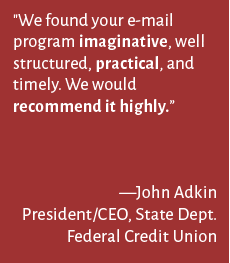Achieving Better Attitude, Better Communication, and Less Stress on the Job
A Three-Part Seminar
This program consists of three consecutive half-day modules, each module building on the previous one.
The learning experience will bring participants through a highly interactive, comprehensive experience. It takes best practices from multiple fields of interpersonal skills and blends them into a unique, sustained focus on teaming.
The module sequence is structured as follows:
Module I: Building a Better Attitude
This module will lay the groundwork for all subsequent modules in the workshop. The attitude that people bring to their work—and their interactions with colleagues and clients – is a critical factor in all facets of effective teaming.
Section A: Raising Attitude Awareness
This opening section helps recognize negative vs. positive attitudes and how these attitudes affect participants’ workplace:
Section B: The Power of a Positive Attitude
With a “positive attitude” defined, this section moves through the benefits of having one at work – both as an individual and as a team member.
Section C: Developing a Positive Attitude
This brings participants through several proven ways to gain a positive attitude – changing “I can’t” to “I can.”
Section D: Keeping a Positive Attitude
Positive change is good, but to be really effective it should become a permanent part of working life. This section presents real-world steps to keep a positive attitude.
Module II: Better Communication
This half-day module presents the three most critical communication skills in powerful teaming:
Section A: Active Listening
Participants learn to listen more effectively to elicit clear communication from colleagues. They learn to neutralize unconscious beliefs affecting their reception, to read body language, and to “broadcast” back to the speaker the message received so that it can be clarified.
Section B: Effective Meetings
Participants learn the power of consensus, and apply active listening to improve team and cross-team meetings. They learn the duties of the Facilitator, Recorder, and Member roles which will make them advocates for each other in meetings, ensuring clear communication, accountability, and follow-through.
Section C: Group Problem Solving
Participants learn to solve problems as a team, instead of relying on higher-ups to do so. They learn how to define problems to encourage creative thinking, to create a no-judgment zone that protects people from attack, and to translate their ideas into action.
Module III: Reducing Stress
Section A: Conflict Management
Participants are reminded that conflict is a fact of work life and will never go away entirely. Strategies presented enable participants to defuse conflicts when they arise and often make them into learning opportunities.
Section B: Expressing Appreciation
Participants learn that reducing stress in the workplace starts with a supportive work culture that validates the contributions of each team member. Strategies presented will clarify the type of language that makes people feel valued and motivated on a team.
Participants develop an awareness of cross-cultural rhetorical models, and recognize that some miscommunication is based in cultural backgrounds. Participants learn to focus on content and common goals, rather than on judging modes of communication. Participants learn to identify differences in values that are culture-based, and how they affect communication.
Section C: Managing Diversity
Participants explore their own core values and identify which groups or cultures contribute to their unique identity. They learn to identify differences in values that are culture-based, and how they affect communication.
Students learn to recognize areas of cultural miscommunication. They are empowered to take advantage of these differences to learn valuable lessons about their diverse team members, strengthening and enriching their team.
Return to All Whelan Group Seminars

Clients
- ● The World Bank
- ● Apple
- ● United Nations
- ● UC Berkeley Haas School of Business
- ● International Finance Corporation
- ● National Institutes of Health
Most Popular Seminars
Ten Secrets to Powerful Business Writing
Communicate effectively using ten highly focused mega-principles of professional business writers.
Ten Secrets of Powerful E-Mail
Learn scores of powerful strategies to tap the full communications power of e-mail and avoid its lethal traps.
Contact
New York
whelangroupNY@gmail.com
845-389-0350
Washington, DC
whelangrouprcn@gmail.com
202-797-8132
